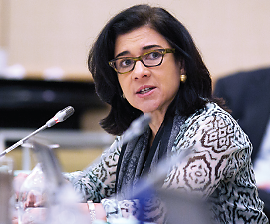APA to Use New Term for “Member-in-Training”
Abstract
The APA Board also approves the formation of two member caucuses and decides on a new way to identify members who are in a psychiatry training program.
The term “member-in-training” will soon disappear from the official APA lexicon. At their meeting last month in Arlington, Va., members of the APA Board of Trustees voted to replace the long-used terminology to describe residents and fellows with “resident-fellow member,” or RFM.

From left: APA/Leadership Fellow Uyen-Khanh Quang Dang, M.D.; APA/SAMHSA Fellow Phillip Murray, M.D.; Resident-Fellow Member Trustee-elect Lara Cox, M.D.; and Resident-Fellow Member Trustee Erik Vanderlip, M.D., listen to a debate at which the term “member-in-training” was officially replaced by “resident-fellow member.”
In backing a proposal voted by the APA Assembly at its November 2013 meeting, the Board agreed that the member-in-training nomenclature is often unclear to residents and fellows who are not APA members and to physician members of other specialty societies. To some, the Assembly proposal stated, the term “could be misunderstood as additional training, aside from residency training, that is required to become a member of APA.” The proposal noted as well that the Accreditation Council for Graduate Medical Education uses “resident” and “fellow” to describe physicians in training programs, as does the AMA, which has a Resident-Fellow Section. In addition, the National Board of Medical Examiners uses the terms “resident” and “fellow” in materials discussing employment opportunities through the annual Match system, the Assembly proposal pointed out.
Commenting on the name change, Erik Vanderlip, M.D., who was elected as the Member-in-Training Trustee and is now the Resident-Fellow Member Trustee, said, “Although seemingly subtle, the shift . . . heralds the beginning of a new era in APA member relations and communication—starting with its most vital demographic. The shift is emblematic in a number of ways. Initially proposed within the APA Assembly Committee of Residents and Fellows in November, it was championed through support from a variety of channels and rapidly approved by the Board in early December. It represents the nimble responsiveness of an organization ready to take good ideas from membership and convert them to action.”
The APA Board of Trustees at its December meeting approved the formation of two new caucuses: the Global Mental Health and Psychiatry Caucus and the Caucus on Psychotherapy.
The Global Mental Health and Psychiatry Caucus is envisioned as a “catalyst” for discussions on the “biological, psychological, and social determinants of health and their presentation in the national and international arenas.” Addressing the consequences of stigma directed at mental illness and its treatment will also be part of the caucus’s mission.
Among the founding members of the caucus are several psychiatry residents who have been involved in the Washington Psychiatric Society’s Career, Leadership, and Mentorship program and the program’s founder and chair, Eliot Sorel, M.D., a clinical professor of psychiatry and behavioral sciences at George Washington University School of Medicine, where he is also a clinical professor of global health, health systems management and leadership.
The Caucus on Psychotherapy is envisioned as a way of “promoting communication and networking among APA members who share a special interest in psychotherapy,” said Eric Plakun, M.D., chair of the Assembly’s Task Force on Psychotherapy, in a letter to President-elect Paul Summergrad, M.D., explaining the need for such a caucus. Plakun noted as well that despite a growing body of evidence that psychotherapies are effective treatments for psychiatric disorders, “psychiatrists are doing less psychotherapy.” The caucuses will meet at the APA annual meeting in May.
The Board also voted to appoint an ad hoc work group that will examine ways to attract more minority and underrepresented group (M/UR) psychiatrists to APA membership and retain them as members once they join. Similar work groups have issued reports to the Board on recruitment and retention of early career psychiatrists and residents. The charge to the new work group includes identifying barriers that may be deterring M/UR psychiatrists from joining APA and remaining members over the long term and “determining the actual and perceived value of membership in APA for M/UR psychiatrists and trainees.” The proposal to establish the work group was supported by the Council on Minority Mental Health and Health Disparities.

APA Secretary Maria Oquendo, M.D., updates the Board on activities of work group that is addressing issues pertinent to minority/underrepresented psychiatrists.
Also at last month’s Board meeting, Howard Goldman, M.D., Ph.D., chair of the Board’s Health Care Reform Strategic Action Work Group, updated trustees on the group’s progress in developing ways to help members become educated about the how the changing health care system is likely to affect the way they practice. Goldman noted that by early spring the work group will have several products for the Board to review. Work group members are nearing completion of a toolkit to assist district branches and state societies on how to work with state officials to amend state plans regarding community-based services in the Medicaid program. A second toolkit will help members deal with Medicaid managed care contracts. In addition, the work group is preparing two white papers on performance measurement in behavioral health.
The work group is also focusing on educating psychiatrists on how to be effective clinicians in integrated or collaborative care settings and is considering development of a toolkit for members in conjunction with the AIMS Center at the University of Washington, which is dedicated to integrated care solutions in the mental health field.■



